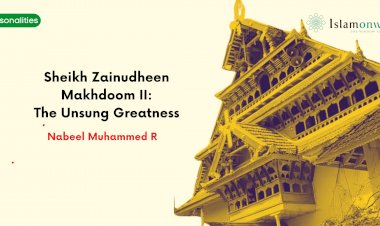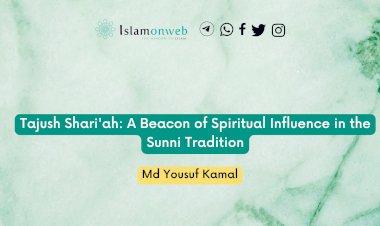ʿĀʾishah bint Yūsuf al-Bāʿūniyyah: The Poetess of Prophetic Love
In the annals of Islamic scholarship, few women have left as profound a mark as ʿĀʾishah al-Bāʿūniyyah. A renowned scholar, Sufi mystic, and poet from Damascus, Aisha al-Ba'uniyya stands out not only for her deep knowledge and mastery of Islamic sciences but also for her unparalleled devotion to the Prophet Muhammad, which she eloquently expressed through her poetry. Her life and works provide a remarkable example of a woman who transcended the societal constraints of her time, leaving a legacy that continues to inspire devotion and spiritual awakening in the hearts of many.
ʿĀʾishah al-Bāʿūniyyah is often mentioned alongside other notable women in Islamic history, such as Sayyida Sakina bint al-Hussain, Sayyida Nafisa, and Rabi’a al-Adawiyya. These women were not just scholars or mystics but were trailblazers in their own right, contributing to the intellectual and spiritual traditions of Islam. Among them, Aisha al-Ba'uniyya is particularly renowned for her unique contribution to madih nabawi, the genre of poetry dedicated to praising the Prophet Muhammad.
Early Life and Scholarly Pursuits
Aisha al-Ba'uniyya was born in Damascus in the 15th century, into a family known for its piety and scholarship. Her lineage, connected to the town of Ba'un in present-day Jordan, traces back to a family deeply rooted in Islamic learning and spirituality. Growing up in an environment rich in religious scholarship, Aisha was immersed in the teachings of the Quran and the Islamic sciences from a young age. Her father, Yusuf al-Ba'uni, was a notable judge and scholar who played a pivotal role in her education, ensuring she received the finest training in the Quran, Hadith, Islamic jurisprudence, and Sufism.
Aisha’s thirst for knowledge led her to study under some of the most prominent scholars of her time. She was well-versed in the four Sunni schools of jurisprudence and had a profound understanding of both exoteric and esoteric sciences. Her erudition earned her a reputation not just in Damascus but also in the broader Islamic world. She held positions of teaching and issuing fatwas, a rare achievement for a woman in her era, reflecting the esteem in which she was held by her contemporaries.
While Aisha al-Ba'uniyya excelled in various fields of Islamic knowledge, it was her mystical inclinations that truly set her apart. Her spiritual journey was greatly influenced by the teachings of renowned Sufi masters. She studied Jamāl al-Dīn Ismā‘īl al-Ḥawwārī and his successor Muḥyī al-Dīn Yaḥyá al-Urmawī, whose teachings deepened her understanding of Sufism and its focus on love and divine proximity.
Aisha's writings are imbued with the themes of divine love and devotion, reflecting her profound spiritual experiences and her yearning for closeness to Allah and His Messenger. Her poetry, in particular, stands out as a testament to her deep spiritual insights and her passionate love for the Prophet Muhammad.
Poetry as an Expression of Love for the Prophet
Aisha al-Ba'uniyya's poetic works are a vibrant expression of her love for the Prophet Muhammad. Her poetry is not merely an artistic endeavor but a spiritual practice, a means of expressing her deep-seated devotion and longing for the beloved Prophet. Through her verses, she invites readers and listeners to embark on a journey of spiritual awakening, urging them to cultivate a similar love and devotion.
Aisha al-Ba'uniyya was deeply influenced by the poetic traditions of her predecessors, particularly Imam al-Busiri, the famed author of the Burda (The Mantle Ode), one of the most famous poems in praise of the Prophet Muhammad. Aisha admired al-Busiri’s work so much that she composed a khamsa (a poetic form in which each verse of the original poem is expanded with additional lines) of the Burda. This endeavor not only showcases her poetic talent but also her deep spiritual connection to the tradition of praising the Prophet.
In her adaptation, she writes:
In the beauty of the rising moons on the hills of Salam,
I joined the ranks of lovers, like a banner that commands.
I speak while tears stream, wounding my eyes,
And my neighbour rebukes, accusing my love's cries.
Her adaptation of the Burda is not just an exercise in poetic form but an act of devotion. By expanding upon al-Busiri’s verses, Aisha weaves her own spiritual journey into the embroidery of Islamic devotional poetry, thus enriching the tradition with her unique voice and perspective.
Oh, love’s power! In love, I’ve given up my soul,
Yet no glad tidings have I found from their distant call.
In my weeping, I lament what’s now lost to nothingness,
I feigned patience, but it failed to stem my tears' distress.
Her poetry often reflects the dual themes of separation and longing, common in Sufi literature, where the physical absence of the Prophet is felt deeply by the lover. Yet, this absence also fuels the desire for spiritual proximity, creating a dynamic interplay of distance and closeness. In another verse, she writes:
"Beloveds who have remained the summit of my aspirations,
Even if their distance has intensified my pain."
This sense of longing for a reunion with the Prophet, both in the physical sense and the metaphysical sense, becomes a recurring theme in her work. Aisha’s poetry is not merely about praise; it is about a profound spiritual connection that seeks to transcend time and space.
Some of her lines can be translate as below:
I’ve reached in love a place so far, unseen,
None knows it but a heart like mine, serene.
I hide my state, yet sorrow breaks my guise,
Betrayed by tears and weary, longing sighs.
They said, "Be wise," I answered, "Heart’s not swayed."
They said, "Turn back," I answered, "Vow's not frayed."
They said, "You've healed," I answered, "Patience holds."
They said, "Despair," I answered, "Healing is in my wound."
O blamer, you’re excused, for soon you’ll see,
When dawn unveils what darkness tried to be.
Her Works
Aisha al-Ba'uniyya authored several works in both poetry and prose and had extensive knowledge in the jurisprudence of the four Islamic schools of thought as well as in the biography of the Prophet (Seerah). This was particularly evident in her compositions about the Prophet. She had a broad understanding of Sufism, incorporating the views of many Sufi mystics into her poetry. She also drew upon the opinions and poems of at least fifty poets and critics in her commentary on her "Badi'a" (a type of classical Arabic poem). Known for her beautiful handwriting, she is considered one of the creative calligraphers, having written most of her works in her own hand.
Her works include “Al-Fath al-Mubin fi Madh al-Amin” (The Clear Victory in Praise of the Trustworthy), which also reflects her deep admiration for the Prophet Muhammad. Her works, characterized by their elegance, depth, and spiritual intensity, earned her a prominent place among the poets and scholars of her time.
What distinguishes Aisha’s legacy is her ability to seamlessly blend scholarship with deep spiritual insight. Her writings are not just academic texts but are also spiritual guides, providing readers with both intellectual enrichment and spiritual nourishment. Her book “Al-Mawrid al-Ahna fi Mawlid al-Asna” (The Pure Source in the Most Beautiful Birth) is a reflection on the Prophet’s birth, written with such tenderness and love that it has been recited in religious gatherings and Sufi circles for centuries.
Her work Durar al-ghā’iṣ fī baḥr al-Mu‘jizāt wa ’l-kha-ṣā’iṣ (The Diver's Pearls, on the Sea of "The Miracles and Virtues") is collection of 1740 lines that reflects on the Prophet’s miracles and unique qualities, written with a sense of reverence and devotion. In these works, Aisha combines her scholarly rigor with her poetic talent, offering readers both intellectual enrichment and spiritual nourishment.
Among her manuscript works is also the "Diwan of Aisha al-Ba'uniyya," known as "Fayd al-Fadl" (The Overflow of Grace), which comprises six poems in praise of the Prophet Muhammad, peace be upon him. Other works include "Majmu' fi Kalam al-Sayyida Aisha al-Ba'uniyya fi al-Tasawwuf" (A Collection of Lady Aisha al-Ba'uniyya's Words on Sufism), the "Urjuza al-Qawl al-Badi'" (The Excellent Poem), an urjuza in which she summarized the book "Al-Qawl al-Badi' fi al-Salat 'ala al-Habib al-Shafi'" by Imam Al-Hafiz Shams al-Din al-Sakhawi, and "Al-Malamih al-Sharifa fi al-Athar al-Latifah" (The Noble Features in the Subtle Traces), which includes Sufi chants and spiritual insights. Other works include "Al-Fath al-Haqiqi min Minh al-Talaqqi" (The True Opening from the Gifts of Reception) and "Al-Mu'jizat wal-Khasa'is al-Nabawiyya" (The Miracles and Characteristics of the Prophet).
Recognition and Influence
These contributions have led historians to describe her as a luminous figure in the history of Islamic civilization. Historians consider her one of the most famous women of the 9th and 10th centuries AH, known for her pioneering role among her generation’s scholars in fields such as jurisprudence, the biography of the Prophet, Arabic sciences, and spiritual purification (Tazkiya).
Many distinguished scholars studied under Aisha, benefiting greatly from her knowledge, and numerous students of knowledge gained from her expertise. Her biography was recorded by several authors of historical works, including the historian Khayr al-Din al-Zarkali in his book "Al-A'lam," the Hafiz of Damascus Najm al-Din al-Ghazzi in his book "Al-Kawakib al-Saira bi-A'yan al-Mi'a al-'Ashira" (The Wandering Stars on the Notables of the Tenth Century), and the jurist and historian Ibn al-Imad al-Hanbali in his book "Shadharat al-Dhahab fi Akhbar man Dhahab" (Fragments of Gold in the News of Those Who Passed Away). Ibn al-Imad described her as: "The righteous, scholarly lady, a remarkable individual of the ages, and a rarity of time in virtue, literature, knowledge, poetry, religion, and integrity. She was the most knowledgeable woman of the 10th century AH." Some even said, "Perhaps no woman in the history of Islam after the great female Companions and their followers matches her in knowledge, virtue, proficiency, and authorship." She was a distinguished figure of her time and a companion of literature everywhere.
Aisha al-Ba'uniyya's works have continued to resonate through the centuries, earning her recognition far beyond the borders of Damascus. In 2006, UNESCO honored her by including her in the list of notable figures celebrated that year, acknowledging her significant contributions to literature and spirituality.
Her influence extends beyond her poetry; she is considered a model of piety and scholarship, particularly for women. Her life challenges the conventional narratives of women's roles in Islamic societies, demonstrating that women were not only active participants in the intellectual and spiritual life of the Islamic world but also leaders and innovators.
Her poetry, in particular, has continued to inspire not only scholars but also ordinary Muslims who find in her verses a profound expression of their own love for the Prophet Muhammad. Her works are still recited in Sufi gatherings and are considered a source of spiritual inspiration, particularly in times when Muslims seek a deeper connection with their faith and the Prophet.
Her life, marked by scholarly achievements and deep spiritual insight, offers a timeless example of what it means to live a life in service to God and humanity. Her poetry, with its rich imagery and profound emotion, remains a source of inspiration, inviting us all to a deeper understanding and love for the Prophet Muhammad.
References
Shadharat al-Dhahab by Ibn al-Imad.
A'lam al-Nisa' by Zarkali.
Famous Muslim Women: Aisha al-Ba'uniyya - Various Islamic manuscripts and historical texts documenting her life and contributions.
Collected Works of Aisha al-Ba'uniyya - Original Arabic texts and translations.
Disclaimer
The views expressed in this article are the author’s own and do not necessarily mirror Islamonweb’s editorial stance.
























Leave A Comment